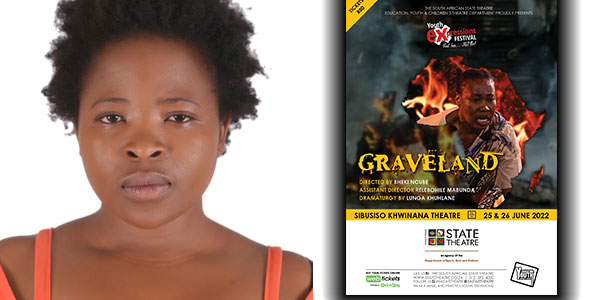Rising talent to explore community theatre and policies in Germany
- Wits University
Masters student Relebohile Mabonda wraps up a performance and prepares to join the German Chancellor's Fellowship Programme for prospective leaders.

The programme, knows as the German Chancellor's Fellowship Programme of the Alexander von Humboldt Foundation, supports future decision makers and thought leaders across various fields of studies.
Mabonda whose research is titled An analysis of stakeholder relationships and the social potentials of culture through the example of community art centres in South Africa and Germany, seeks to produce strategies that can enhance the potential of community art centres in South Africa. With the results from her research, Mabonda hopes contribute to academia and influence policymakers to recognise the value of the arts and community art centres. This builds on her previous research titled Ke mang ya ba ranthanyang? (Who is ripping them apart?) An Analysis of Township Community Art Centre Stakeholders in Democratic South Africa.
Raised in Daveyton, Mabonda first tasted the power of the arts whilst in boarding school in Lesotho taking part in school plays. She was fascinated by storytelling and poetry. On her return to South Africa she joined the local community theatre and this saw her perform in many townships. She later joined the State Theatre’s Youth InTrust and won the most promising performer. Wanting to understand her craft better, Mabonda enrolled at Wits for a Postgraduate Diploma in Arts followed by a BA honours specialising in Applied Drama: Theatre in Education, Communities and Social Context, both attained with distinction.
She has performed at the National Arts Festival in Makhanda, formerly Grahamstown.
A rising performer, writer and director, Mabonda’s work is driven by the mission to contribute to social and therapeutic changes in communities. Consequently, her postgraduate studies focus on impact of stakeholders and leadership on community art space and how these influence cultural policies in South Africa.
Mabonda says she is looking forward to her trip. “Germany has a better understanding of arts, politics and innovative cultural policies driven by the idea of social inclusion, something that we in South Africa need for community arts and art spaces.”
Her school is equally excited.
“I am delighted with this opportunity and see it opening many doors of success for this gusty young woman,” says Avril Joffe, Postgraduate Programme Coordinator and lecturer in Cultural Policy and Management at Wits University.
About the fellowship:
The German Chancellor Fellowship is open to citizenship from South Africa, Brazil, China, and the United States of America. For admission, prospective students need to have completed their first degree in fields such as politics, business, media administration, society or culture. In addition, students need to also demonstrate leadership experience. During their one year programme, students must implement a project that supports their career development, has social relevance and a lasting public impact.
“I am looking forward to participating in the fellowship, I believe this programme challenges the perception that research papers are submitted to gather dust on library shelves. This fellowship promotes knowledge sharing with peers on a globally scale and integrates various perspectives to contribute significantly to the cultural sector, particularly municipal leaders and policy makers,” concludes Mabunda.
In Germany, Mabunda will be hosted by the IFA (Institut für Auslandsbeziehungen). Prior to starting classes in October, she will undertake a three-months language course to help with the transition.

